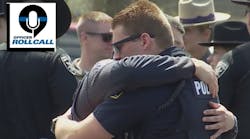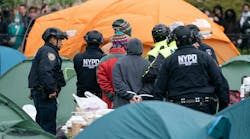Many aviation units have been tasked with the assignment of homeland security/counter-terrorism missions. Unfortunately, many units are not given direction as to how to conduct these assignments nor exactly what their mission is and what larger objectives the agency is seeking to achieve other than prevent an attack. There is more than one aviation unit commander that has been asked, "Are you patrolling locations with an eye on terrorist activity?" After a nervous chuckle and shuffling of the feet, he answers, "Of course!" The truth? Many aircrews simply pick and choose a location they want and conduct a "counter-terrorism patrol." Hardly a focused and directed approach, it is more akin to the "needle in the haystack" approach. How can we better focus these missions with real and clear objectives? Develop mission profiles based on specific and credible threats or world events.
The Aviation/Intelligence Partnership
If your agency/department has a formal "Intelligence" component, you already have a tremendous resource in developing a mission profile. The intelligence people should have a good idea on what locations and sites are high priority and should receive the attention of law enforcement assets. If you couple these known targeted sites with intelligence information received by your agency, you can develop a mission profile. For example, a particular patrol command in your agency has received two reports of persons taking pictures of the local airport's jet fuel farm. The units that responded did not find the persons taking the pictures but were informed by eyewitnesses that on two occasions they observed two men taking numerous photographs of the jet fuel farm. One of the eyewitnesses challenged the men and was told, "Don't you worry about it; we are from the state." Responding personnel filled out and filed a field intelligence report and forwarded it to the appropriate unit in your department. Of course, a check with the state shows that they had no employees in that area and have no pending or future projects involving the fuel farm. Furthermore, your intelligence unit has been informed in a confidential memo from federal authorities that terrorists have taken a keen interest in jet fuel farms, with no further specific information. This is an ideal example of units working together and formulating a specific and focused mission. Directed patrols can be assigned to patrol, aviation and specialized units to focus on the jet fuel farm.
Lacking active intelligence, your agency can keep abreast of world events and activities. The activities abroad can give a hint of intentions here and determine strategy. For example, the London subway bombings, the Madrid commuter train bombings and the recent failed London car bomb attacks all give a clue as to the terrorists' intentions and methods of operations. If an attack occurs on a chemical plant in Germany, it would certainly warrant closer scrutiny of chemical plants here. If a cruise ship was attacked in the Philippines, it would mean a closer look at cruise ships' arrivals and departures.
What if your agency has no formal intelligence component? Create your own! Designate an officer assigned to the aviation unit to comb local, state and federal as well as commercial websites for the latest intelligence information on terrorist groups. This assigned officer should develop a relationship with and interact with personnel from the local, state and federal levels. Find out what the trends are and what the "word on the street" is regarding terrorism. Several years ago, a document was recovered by our U.S. military forces that outlined exactly what locations and sites that Al-Qaeda covets and exactly how they train and will carry out these missions. This document was widely distributed to law enforcement. Have your personnel give it a look. It is fascinating reading.
The Aviation Mission
The famous Chinese General Sun-Tzu wrote an acclaimed book thousands of years ago called The Art of War. In this book, he writes that "all warfare is based on deception." In the war on terror, things are no different. It is common knowledge that terrorist operatives will conduct weeks, months or even years of intelligence gathering of an intended target. It is our mission to interrupt, prevent and stop these attacks from occurring. The aviation mission is therefore two-fold. One, create a presence; coupled with patrol and specialized units, a presence that deters them from a particular target. Be highly visible and make noise. The purpose is high visibility. Two, gather intelligence. Look for suspicious cars, look for suspicious people. Is that really a county work crew working on the street in front of the chemical plant? Find out! Work with all units within your agency to construct a focused and comprehensive counter-terrorism mission rather than just choosing random locations for directed patrols. The whole effort will be much more effective with cooperation and teamwork.
The Results
Although difficult to measure empirically, an agency can see at least some of the results of their efforts. One, the lack of attacks certainly means we are doing something right. Two, intelligence received from terrorist organizations might hint at the success of a strategy. In 2004, a terrorist operative had been assigned to blow up the Brooklyn Bridge in New York City. During his pre-mission surveillance, he constantly saw NYPD helicopters, harbor boats, patrol units and the heavily armed Emergency Services Unit performing patrols on the bridge. Obviously, this presence would have a severe impact on the planned attack and he sent an e-mail back to his superiors: "I will be unable to continue my assigned mission because the weather is too hot." The weather, of course, was the police presence.
The question is always, will they hit us again? Although difficult to know precisely, it is our mission and duty to try and prevent it.


